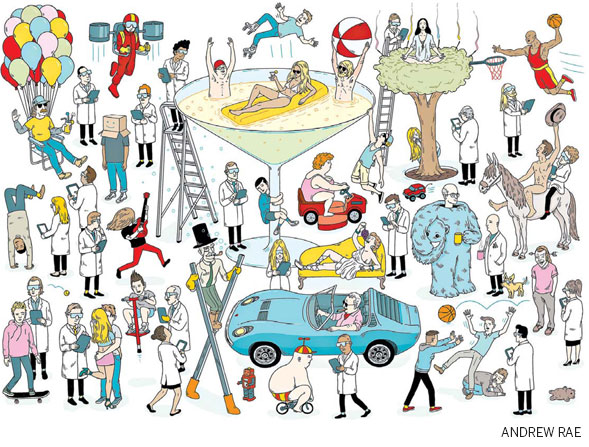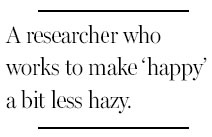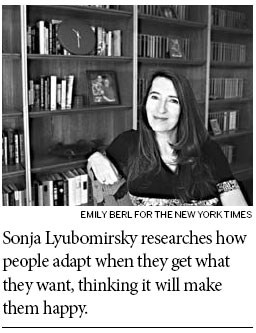An inside look at happy
Updated: 2013-04-28 05:45
By Elizabeth Weil(The New York Times)
|
|||||||

Psychologist studies what makes people look at life differently
Sonja Lyubomirsky says you have a happiness set point, partly encoded in your genes. If something good happens, your sense of happiness rises; if something bad happens, it falls.
But either way, before too long, your mood will creep back to its set point because of a powerful and perverse phenomenon referred to in science as "hedonic adaptation." You know, people get used to things.
With her 2007 book, "The How of Happiness," and this year's follow-up, "The Myths of Happiness," Dr. Lyubomirsky, a psychology professor at the University of California, Riverside, secured her place among happiness-industry stalwarts, from M. Scott Peck with "The Road Less Traveled" to Martin E. P. Seligman and "Learned Optimism" to Daniel Gilbert and his best-selling "Stumbling on Happiness."
Dr. Lyubomirsky's findings can be provocative and, at times, counterintuitive. Renters are happier than homeowners, she says. Interrupting positive experiences makes them more enjoyable. Acts of kindness make people feel happier, but not if they are compelled to perform the same act too frequently. (Bring your lover breakfast in bed one day, and it feels great. Bring it every day, and it feels like a chore.)
Dr. Lyubomirsky may seem like an unlikely mood guru. "I really hate all the smiley faces and rainbows and kittens," she said. She doesn't often count her blessings or write gratitude letters, even though her research suggests they make people happier.

For years, worried that the study of how to increase happiness would sound too lightweight, she focused instead on categorizing characteristics of happy and unhappy people with clinical, almost anthropological detachment. But everyone kept asking: How does it work? How can you make yourself happier?
So Dr. Lyubomirsky finally turned her research toward those questions.
She has found that unhappy people compare a lot and care about the results. They tend to feel better when they get poor evaluations but learn others did worse than when they get excellent evaluations but learn others did better.
In one experiment, she asked two volunteers at a time to use hand puppets to teach a lesson about friendship to an imaginary audience of children. Afterward the puppeteers were evaluated against each other: you did great but your partner did better, or you did badly but your partner was even worse.
The volunteers who were happy before the puppeteering review cared a bit about hearing that they had performed worse than their colleagues but largely shrugged it off. The unhappy volunteers were devastated. Dr. Lyubomirsky writes: "It appears that unhappy individuals have bought into the sardonic maxim attributed to Gore Vidal: 'For true happiness, it is not enough to be successful oneself. ... One's friends must fail.'"
This, she says, is probably why more people know the German word schadenfreude (describing happiness at another's misfortune) and almost nobody knows the Yiddish shep naches (happiness at another's success).
Dr. Lyubomirsky, 46, was born in Moscow. She emigrated with her parents and brother to the United States at age 9 with the help of the Hebrew Immigrant Aid Society.
At Harvard University, she took a course from Brendan Maher, the psychology professor credited with changing psychology from a soft science based on descriptions to a hard one based on data, and decided she wanted to major in the field. After college, she moved west to Stanford University in California, where her graduate school adviser, Lee Ross, suggested she study happiness.

"At the time," Dr. Lyubomirsky said, "only one person was studying happiness: Ed Diener. Back then it was called 'subjective well-being' and the topic was considered very fuzzy."
Dr. Lyubomirsky spent that decade trying to define what happy and unhappy people were like. According to her friend Andrew Ward, now in the psychology department at Swarthmore College in Pennsylvania, "the working assumption in those years was that happy people were rationalizing all the time." So Dr. Lyubomirsky designed an experiment in which people ranked 10 desserts, knowing they would get one. Each participant was then given his second or third choice and told to rank all 10 desserts again.
Who rationalized the desserts they received? The unhappy people. Dr. Ward said, "The happy people said, 'Well, this dessert is good, and I'm sure the others are good, too!' The unhappy people liked their desserts just fine but indicated they were extremely relieved not to have received the 'awful' nonchosen dessert. In other words, unhappy people derogated the dessert they did not receive, whereas happy people felt no need to do so."
In January 1999, Mr. Seligman and Mihaly Csikszentmihalyi, the author of "Flow: The Psychology of Optimal Experience," invited Dr. Lyubomirsky and about a dozen other psychology academics under 40 to Akumal, Mexico. There, Mr. Seligman willed the field of positive psychology into being. The group wrote a Positive Psychology manifesto. They defined the field as "the scientific study of optimal human functioning" and asserted "a new commitment on the part of research psychologists to focus attention upon the sources of psychological health, thereby going beyond prior emphases upon disease and disorder."
Today, Dr. Lyubomirsky doesn't consider herself a positive psychologist and thinks the word "positive" is unnecessary. "I'm really not interested in happy people," she insisted. "I'm interested in how happiness changes over time and what strategies can increase happiness."
She said that when her family moved recently, her husband, Peter Del Greco, wanted to buy a big high-definition TV. "I said to him, 'You're going to adapt to it.' Of course, he still wanted it. And he adapted to it."
Dr. Lyubomirsky doesn't think people will learn not to adapt. "We're so focused on the now," she said. "The present is so compelling. It's hard-wired."
The New York Times
(China Daily 04/28/2013 page9)